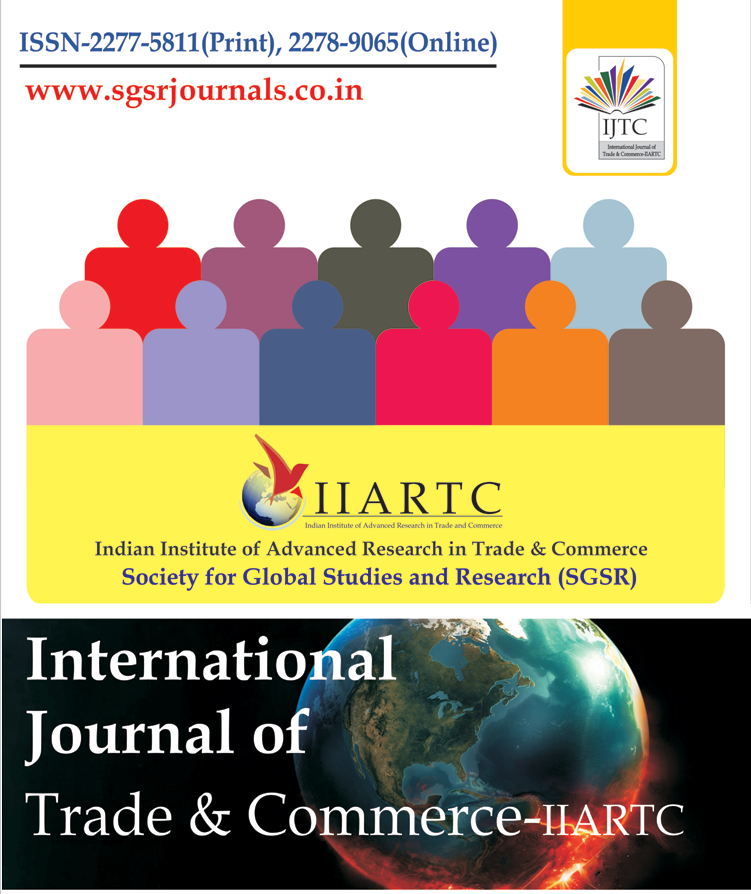Home ⇨ International Journal of Trade & Commerce-IIARTC

International Journal of Trade & Commerce-IIARTC
Impact Factor (IF):5.135 (COSMOS), IF:7.249 (ISRA), IF:3.721 (ISI)
ISSN:2277-5811 (P), ISSN:2278-9065 (O)
Frequency: Half Yearly
Information and Communication Technology Policy Review Report on Encourage Closer Collaboration between Academia and Industry to Align Curriculum with Market Needs
Sharing of knowledge particularly e-knowledge as a factor of production contribute significantly for the socio-economic development and growth of marketability in a country like Bangladesh. ICT plays an indispensable role in promoting openness, accessibility, accountability, connectivity, democracy and decentralization are so essential for effective social, economic, political, academic and commerce and industrial development as well. Through the positive vision, Bangladesh can wake up this giant with effective access of academia, pertinent construction of human resources and perceiving market needs in best possible strategic fashion. Over the last few years, Bangladesh intends to use ICT as the key-driving element for socio-economic as well as e-education and curriculum development. As such Government of Bangladesh is trying to develop the ICT as a thrust sector. The proper analysis of the national ICT policy of 2002, 2009 and 2015 indicates that appropriate application of these policy frameworks will assist to implement the vision 2021 of government of Bangladesh based on true market needs. The main objectives of the study is to evaluate and find the gap and progress with the effective manner. As findings of the study depicts that national policy of ICT is to create all sorts, appropriate infrastructural facilities and develop human resources enabling development of software industry both by the local and international participation. The study also depicts that educators’ perception and the industrial decision makers’ perception regarding the necessity of collaboration needed between academia and industry to align curriculum with market needs. Data in the produced graph shows three categories (low, medium and high) of responses. And finally, 50 percent respondents of industrial decision makers have high level of responses for encouraging closer collaboration between academia and industry to align curriculum with market needs, on the contrary, 40 percents of the educator’s responses expressed high level of necessity to encourage closer collaboration between academia and industry for aligning curriculum with market needs. Considering various aspects, the ICT policy of Bangladesh has been considered prudent to compare with that of India. As the recommendation can be put forwarded fruitfully overcome the situations. Policy makers should launch into a co-ordinated effort to make this possible and facilitate the growth of the ICT education sector in following positive collaboration with SAARC countries. Moreover, to make the ICT education effective one, starting from the grass root level to higher level co-ordination and needs effective use of e-technology through positive endeavor in considering the real field situation.
Author:Mashud Ahmeda, Abdullah Abusayed Khanb, S.K.S. Yadavc*
Abstract:Sharing of knowledge particularly e-knowledge as a factor of production contribute significantly for the socio-economic development and growth of marketability in a country like Bangladesh. ICT plays an indispensable role in promoting openness, accessibility, accountability, connectivity, democracy and decentralization are so essential for effective social, economic, political, academic and commerce and industrial development as well. Through the positive vision, Bangladesh can wake up this giant with effective access of academia, pertinent construction of human resources and perceiving market needs in best possible strategic fashion. Over the last few years, Bangladesh intends to use ICT as the key-driving element for socio-economic as well as e-education and curriculum development. As such Government of Bangladesh is trying to develop the ICT as a thrust sector. The proper analysis of the national ICT policy of 2002, 2009 and 2015 indicates that appropriate application of these policy frameworks will assist to implement the vision 2021 of government of Bangladesh based on true market needs. The main objectives of the study is to evaluate and find the gap and progress with the effective manner. As findings of the study depicts that national policy of ICT is to create all sorts, appropriate infrastructural facilities and develop human resources enabling development of software industry both by the local and international participation. The study also depicts that educators’ perception and the industrial decision makers’ perception regarding the necessity of collaboration needed between academia and industry to align curriculum with market needs. Data in the produced graph shows three categories (low, medium and high) of responses. And finally, 50 percent respondents of industrial decision makers have high level of responses for encouraging closer collaboration between academia and industry to align curriculum with market needs, on the contrary, 40 percents of the educator’s responses expressed high level of necessity to encourage closer collaboration between academia and industry for aligning curriculum with market needs. Considering various aspects, the ICT policy of Bangladesh has been considered prudent to compare with that of India. As the recommendation can be put forwarded fruitfully overcome the situations. Policy makers should launch into a co-ordinated effort to make this possible and facilitate the growth of the ICT education sector in following positive collaboration with SAARC countries. Moreover, to make the ICT education effective one, starting from the grass root level to higher level co-ordination and needs effective use of e-technology through positive endeavor in considering the real field situation.




